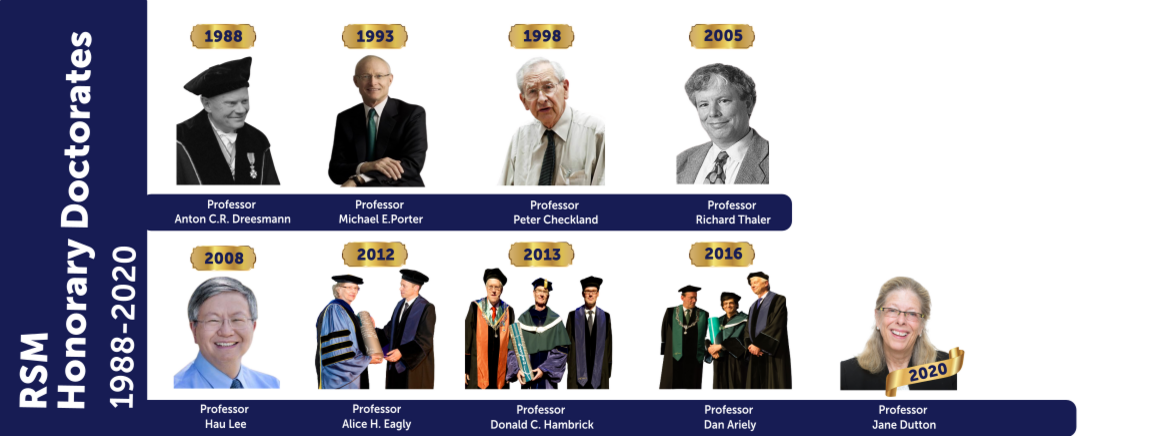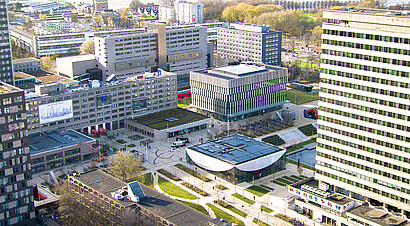RSM is proud of its research, and recognises outstanding contributions to research on management and leadership by academics worldwide. On several occasions of Erasmus University Rotterdam’s dies natalis (anniversary), RSM has selected some of the most distinguished researchers in this field for their excellent studies with an honorary doctorate bestowed by the university.

To celebrate our 50th academic year, RSM bestowed an honorary doctorate degree on Professor Jane Dutton, professor emerita at the Ross School of Business at the University of Michigan.
Jane Dutton has helped us look at organisations, and our own research and understanding, in a new and positive light. Her research and academic leadership lies at the intersection of strategy, management and organisational theory, and psychology:
Jane co-founded the positive organisational scholarship community about 20 years ago. This research initiative was meant to breathe life and humanity into management and organisational research by changing our image of individuals in organisations, and identifying their strengths, emotions and resilience.
She worked her vision into a new research programme. Jane first looked at the role and importance of compassion at work, and how this creates more resilient and harmonious organisational cultures. Then, she looked at the power and impact of forming and cultivating positive relationships at work. She has also looked at ‘job crafting’, the process of employees redefining and reimagining their jobs after finding their purpose and discovering how they can contribute to their organisations and to the relationships around them.
Each of these areas of research are now thriving areas of scholarship, just like Jane’s earlier work on identity and issue selling. New generations of scholars address these and other questions as part of the positive scholarship agenda, which links directly to greater impact on society.
- She was a pioneering voice in research into the purpose, identity and image of organisations – internally and how the media portrays them.
- Her study of the image and identity dynamics of the New York Port Authority is a true classic in the field – and is still required reading for doctoral programmes.
- She conceptualizes and studies the dynamics by which managers and employees identify issues, and how they try to convince others of their importance through organisations’ co-ordinated action.
- Many of her theoretical foundations are still being used in ongoing research on organisational voice and silence, whistleblowing, and moral leadership.
In 2016, RSM awarded an honorary doctorate to Professor Dan Ariely for his outstanding contributions to the study of irrationality in behaviour.
Why do we so often fail to act in our own best interests? Why do we give in to temptations after promising ourselves to eat healthily? Why do we overvalue objects simply because we constructed them ourselves, for example IKEA furniture? Why do 'honest' people often behave slightly dishonestly and still find ways to excuse their acts? What interventions can improve our decision-making so we live a more sensible life?
Such questions have been the focus of Dan Ariely’s research for 20 years. His research has led to great advancements in our understanding of human behaviour. His devotion to valorisation and his gifts as a speaker, writer, mentor, and consultant have enabled his research to achieve enormous impact worldwide. He has attained a rare status; a scientist who is lauded within the academic community and more widely. His career embodies scientific excellence and societal impact.
Dan Ariely publishes regularly in the Harvard Business Review, a prime source for business executives and students. He achieved even broader impact with his three international bestsellers: Predictably Irrational (2008), The Upside of Irrationality (2010) and The Honest Truth About Dishonesty (2012). A fourth book, Payoff, on what motivates us, was published mid November 2016. These books are all written with his particular blend of humour, personal anecdotes, and plain language. And anyone studying morality and ethics should watch his award-winning documentary: (Dis)Honesty – The Truth About Lies.
Ariely’s audiences are huge and worldwide. His column in The Wall Street Journal called “Ask Ariely” advises on a vast range of questions. His five TED talks have been watched more than 14 million times. As a speaker, Ariely communicates his research in a way that captivates his audiences through the power of storytelling and he is therefore sought-after as a presenter at seminars for business leaders and the general public. Last but not least, he provides advice to companies and policy-makers in his role as a consultant through his Center for Advanced Hindsight.
During the celebration of the 100th anniversary of the founding of Erasmus University Rotterdam, RSM awarded an honorary doctorate to Professor Donald C. Hambrick for his outstanding contributions to the study of gender and leadership.
Professor Hambrick is the Evan Pugh professor and Smeal chaired professor of management at The Penn State Smeal College of Business. His scholarly work focuses primarily on top management: CEOs and top management teams. He is the initiator of the upper echelons perspective, in which he has consistently drawn attention to the sociological, social-psychological, and psychological underpinnings of top managerial behaviour. In a broader sense, Don Hambrick has been the main engine behind the social theory of top management and corporate governance. Until the mid-1980s, top management team and corporate governance research was dominated by economic theories, especially agency theory and optimal contracting theories. While these theories still have merit, economic theories alone provide an overly narrow basis for understanding top managerial behaviour, and must be complemented by a broader social theory perspective. This broader perspective has largely been furnished by Don Hambrick and his students and collaborators, whose upper echelons research programme has pointed to the crucial influence of factors such as strategy formulation processes, executive staffing and incentives, executive leadership, social processes and dynamics within top management teams, and the psychological biases that are particular to people in CEO positions.
Professor Hambrick is also a very influential independent consultant and instructor in executive education programmes. His clients have included Pfizer, IBM, General Electric, Schering-Plough, PWC, Philips, Merck, ARAMARK, Pepsico, The New York Times, McKinsey, Dow Jones, and Pearson. His work is routinely covered in influential international media, including The Economist and Business Week.
RSM awarded an honorary doctorate to Professor Alice H. Eagly for her outstanding contributions and trailblazing work to the study of gender and leadership. The leading psychologist has developed a well-grounded and well-supported theory to capture the gendered nature of leadership. She has systematically documented the evidence for gender differences in leadership in a series of quantitative meta-analyses.
These analyses demonstrate that the challenges faced by women seeking leadership positions is not simply captured by the metaphor of the so-called glass ceiling that would only apply at higher hierarchical levels. Rather, these challenges are better captured by the analogy of a labyrinth, in which women encounter many obstacles at all hierarchical levels – challenges that are encountered right from entry into the system and not just after having risen through the ranks as the glass ceiling suggests. The importance of these insights lie in the implications they convey for managing and changing these leadership challenges.
Professor Alice Eagly is James Padilla chair of arts and sciences, professor of psychology, faculty fellow of Institute for Policy Research, and professor of management and organisations, all at Northwestern University in the USA.
Professor Hau Lee received an RSM honorary doctorate in recognition of the enormous achievements made in the areas of global supply chains and supply chain management.
As a world leader in supply chain management, Professor Lee has been instrumental to the development of many innovations and initiatives in his specialist fields. He has been published widely, is one of the most cited scientists in these areas and is one of the top 50 most-cited authors in business and economic sciences.
His 1997 co-authored Information Distortion in a Supply Chain: The Bullwhip Effect. This paper was voted as one of the ten most influential articles published in the history of the journal Management Science in 2004. His research was used in the European Commission’s FP7-funded INTEGRITY project, which will investigate and seek to improve the transparency in global supply chains between the Far East and Europe, and in which Erasmus University was the lead research partner.
Richard H. Thaler was conferred with an honorary doctorate in 2005 by RSM in recognition of his work in the field of behavioural economics. Behavioural economists study the effects of social, cognitive, and emotional factors on the economic decisions of individuals and institutions and their consequences for market prices, returns, and resource allocation.
Professor Thaler is the Charles R. Walgreen Distinguished Service Professor of Behavioural Science and Economics at The University of Chicago Booth School of Business where he is director of the Center for Decision Research. He is also a research associate at the National Bureau of Economic Research where he co-directs the behavioural economics project. Thaler’s research is on the interface of psychology and economics. He is considered a pioneer in the fields of behavioural economics and finance, and has specialised in the study of saving and investing decision-making. He is the author of numerous articles and the books The Winner's Curse and Quasi Rational Economics, and the editor of the Advances in Behavioural Finance collection.
Professor Thaler has bridged economics, finance and psychology. As a result, he truly innovated the study of economics and finance by establishing the field of behavioural economics and finance.
Professor Checkland was conferred with an RSM honorary doctorate in 1998 in recognition of his work in management science, specifically his development of Soft Systems Thinking and the Soft Systems Methodology (SSM). Soft Systems Thinking and SSM addressed the shortcomings of traditional management science by defining a continuous learning cycle and by understanding that purposeful human activity can be modelled systemically.
Research on SSM, and its use, evolution and practical value is reflected in the number of derived methodologies and hundreds of articles and reports published in numerous journals by Prof. Checkland and other prominent researchers. ‘Systems Engineering’ subsequently evolved into a branch of management science thanks to the acceptance and uptake of his research and methodologies.
After having worked in R&D and managerial roles for the UK’s largest industrial company, ICI, Checkland joined Lancaster University Management School, where he developed his research. Checkland is still with Lancaster University and as an emeritus professor of systems.
Often cited as being the father of modern strategy, Harvard Business School’s Professor Michael Porter is seen as one of the world’s most influential thinkers in the areas of management and competitiveness. In particular, his ground-breaking publication The Competitive Advantage of Nations attracted major attention in 1990. The book offered new theories on how nations compete, and introduced the concept of economic clusters. The impact of his research in these areas has been such that it has guided the economic policy of many nations. Porter’s work on clusters spawned a new body of research that has profoundly influenced global thinking and perceptions of competitiveness.
Michael Porter is the Bishop William Lawrence University Professor at Harvard Business School. He received an RSM honorary doctorate in 1993. Since then, Porter has continued to reshape the world’s thinking on matters of strategy, competition and innovation, for example values-based leadership.
Professor Anton C.R. Dreesmann studied law and economics at the University of Amsterdam where he graduated cum laude with a paper exploring pricing and politics in the retail trade. His grandfather, Anton Dreesmann, founded the Dutch department store chain Vroom & Dreesmann (V&D) with his brother-in-law and partner Willem Vroom in 1887. The younger Dreesmann eventually followed his grandfather and father into the family business and was director of V&D’s branch in The Hague until 1954 when the sudden death of his older brother Willem placed him in a position of greater responsibility.
Dreesmann began a policy of expansion that would see the growth of parent company Vendex International (now Maxeda) into an international business empire that included supermarkets in the USA and a bank in Brazil. Beyond the doors of his workplace, he was a senior member of the Sociaal-Economische Raad (Social and Economic Council) and chairman of two important Dutch trade associations, the Vereniging van Grootwinkelbedrijven and Vereniging voor Distributie Economie. Dreesmann was also a professor of economics at the University of Amsterdam.




